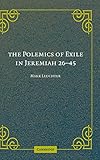The polemics of exile in Jeremiah 26-45 / Mark Leuchter.
Material type: TextLanguage: English Publication details: Cambridge ; New York : Cambridge University Press, 2008.Description: xiii, 320 p. ; 24 cmISBN:
TextLanguage: English Publication details: Cambridge ; New York : Cambridge University Press, 2008.Description: xiii, 320 p. ; 24 cmISBN: - 9780521879910
- 0521879914
- 224.206 22 LEU
| Item type | Current library | Collection | Call number | Status | Date due | Barcode |
|---|---|---|---|---|---|---|
 General Books
General Books
|
CUTN Central Library Religion | Non-fiction | 224.206 LEU (Browse shelf(Opens below)) | Available | 34346 |
1. The hermeneutics of citation: Jeremiah 26 2. The identification of legitimate Israel: Jeremiah 26-32: 15 3. The standards of faith and intermediation: Jeremiah 34-36 4. The fall of Judah, the descent into Egypt, and Baruch ben Neriah: Jeremiah 37-45 5. The polemics of exile 6. The exilic coalition between the Shaphanides and Levites.
Includes bibliographical references (p. 279-297) and indexes.
In demonstrating how the trustees of Jeremiah's prophetic legacy made their case for authority, this book reveals how Israelite religion evolved into early Judaism, in which scribes eclipsed prophets and priests as the mediators of divine will, and in which the interpretation of text became a mode of divine revelation.


There are no comments on this title.